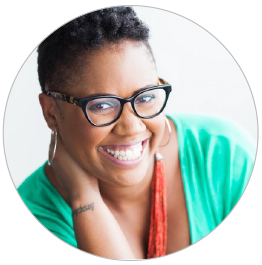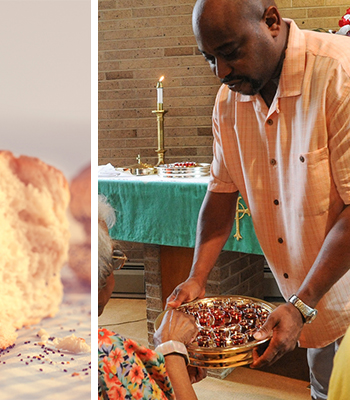by Rozella Haydée White
Lent is my favorite church season. Lent can be a time of remembering how we have become disconnected from each other and from who God intended us to be. During Lent, we are invited to remember and relearn who we are as God’s creation.

Not giving up
Many people think about what they will sacrifice for Lent, what to give up in order to journey deeper into relationship with God. A few years ago, I began the practice of intentionally and mindfully taking something on, something that would challenge me to create a habit that would help deepen my faith. This year, I’m making a commitment to combat those feelings of shame that thwart God’s work of abundance and love.
I’m turning back to the sacraments of communion and baptism, as I seek to uncover all that the Holy Spirit is doing within me, around me and through me for the sake of the Gospel and my relationships with others.
As someone who grew up Lutheran, I confess that I never gave much thought to the meaning of the sacraments of baptism and communion. I knew that both were important aspects of life together in my community of faith, and I could even semi-articulate what they were after I was confirmed at age 14. However, I did not truly recognize the power of our sacramental theology until I experienced more of life; until I encountered powerlessness, loss, disconnection and shame.
Knowing my faith from my baptism
 I have friends who came to Lutheranism later in life, after having grown up in other Christian traditions. I would listen with a sort of envy when they would share heartfelt understandings of baptism and communion. There was a time when I didn’t comprehend the freedom and liberation they described when they talked about receiving communion on a weekly basis or witnessing the baptism of an infant.
I have friends who came to Lutheranism later in life, after having grown up in other Christian traditions. I would listen with a sort of envy when they would share heartfelt understandings of baptism and communion. There was a time when I didn’t comprehend the freedom and liberation they described when they talked about receiving communion on a weekly basis or witnessing the baptism of an infant.
These conversations led me to deeper wondering about my own view of the sacraments — the use of ordinary elements of bread, water and wine to somehow transform my view of myself, of life and of relationships in ways that move me closer to God’s intended vision of humanity.
As I’ve matured, my theological experience of faith has also deepened. While I used to view the sacraments as components of my faith tradition, I now understand them to be the tether that connects me to my understanding of who God is and how God shows up in my life. They keep me grounded in a world that is moving further away from authentic, life-giving connection. I no longer simply go through the motions when participating in a worship experience that includes communion or baptism. I listen intently to the words of institution as the pastor lifts the plate and cup that include elements that are a part of my daily life.
When I witness a baptism, I consider what it means to be part of a community that uplifts, supports, nurtures and loves people into life. I marvel at a God who loves us first, before we can do or be anything, and claims us as beloved. I look at the font, which includes my favorite element and the building block of all life–water. I think about the role that water plays in our lives, how it can be both life-sustaining and life-taking.
I am left breathless as I try to wrap my mind around an all-encompassing grace that leaves no identity behind and calls us to an integrated way of being. And I get a glimpse of a God who chose to come to us, enfleshed, to be in intimate relationship with creation.
The sacraments also took on new meaning to me as I grew to embrace my shadow, as I came to understand who I was as a woman living with mental illness. A key component of my depression and anxiety is traced back to shame. I love how Dr. Brené Brown differentiates between guilt and shame: guilt is thinking that you did something bad. Shame is thinking that you are bad. Guilt is about a situation while shame is about one’s identity.
I had shame. I believed that I was inherently bad. This led to a downward spiral that impacted my view of self, my relationships and how I showed up in the world.
As I sought healing in the forms of therapy, medication and consistent work to address the underlying factors of my shame, I also came to realize that my Christian faith had something to offer in my journey toward healing.
When I think about baptism, I realize that that no matter what my depressed or anxious mind tells me that seems like fact, the reality of who God created me to be supersedes whatever shame would have me take on.
When I go back and re-read the story of Jesus’s baptism, especially in the Luke 3 narrative, I am reminded that baptism is not just about a release of what was. It is fundamentally about a naming and claiming of who we are and who we were created to be by our loving Creator. This has the power to blot out any and every other identity that would threaten to overtake our God-given nature. Shame is one such identity, one such enemy of the life that God wants for each of us. If given the power, shame can convince us that we are unworthy, that we are unloved and that we are not enough.
Baptism and communion call us to remember who and whose we are. By the very nature of using the ordinary to communicate the extraordinary, the sacraments are a tangible experience of God’s grace. They also remind of us the importance of community to get through this thing called life. Communion and baptism are not done in isolation. They are done within the context of a community that is committed to leaning into and living out our God-given identity.
This Lenten season, it is my prayer that you too are able to remember who you are as first called out by God before any other identity was placed upon you. It is my hope that communities of faith be places where light shines into dark places so that shame can no longer hide and destroy.
Discussion questions:
1. What’s your earliest memory of feeling shame?
2. How might we practice being a liberated people rather than a people mired in shame?
3. What role do the sacraments play in remembering your identity?
4. What ways of thinking or being get in the way of you embracing your identity as Beloved Child of God?
Closing prayer
God of liberation, you have shown us what is good, what is true, what is free. Help us to name and call out anything that seeks to separate us from you. Accompany us as we take on that which is life-giving and reminds us of our identity in you. Amen.
Rozella Haydée White is a creator and consultant for individuals, organizations and communities. She currently serves as the Houston city director for Mission Year, an organization committed to walking with young adults as they fall in love with Jesus and the city, come alive in their gifts and purpose, build beloved community across dividing lines and become advocates for God’s justice in our neighborhoods and world. She previously served as director for Young Adult Ministry for the Evangelical Lutheran Church in America (ELCA).


Thank you for sharing your commitment to take on overcoming shame as a Lenten task. It is really not easy to overcome those deeply woven experiences of shame. It is not only a Lenten task, but a lifetime task. Grace is still a nice concept, but how do we, as women, allow it to be a daily experience?
Shame can be paralyzing and is often inflicted by others intentionally or unintentionally. In the true story of the movie Hidden Figures, the women were strong in their identity in Christ through baptism. They were useful in God’s mission. I admire them and want to do this, too. Thank you for bringing the intersection of shame and baptism to greater awareness.
We ended up using this instead of faith reflections for the March meeting.
Dear Rozella Hydee White- may i distribute this piece around a pastors group i meet with in Lockhart TX?
The Sacramental part is useful for articulating the intersection of mainline religion’s sacramental practices and expressions of deep conviction within groups and individuals.
Hi Edwina! Thanks for your interest in sharing this article with your pastors group. I can send you a copy of the article. Elizabeth